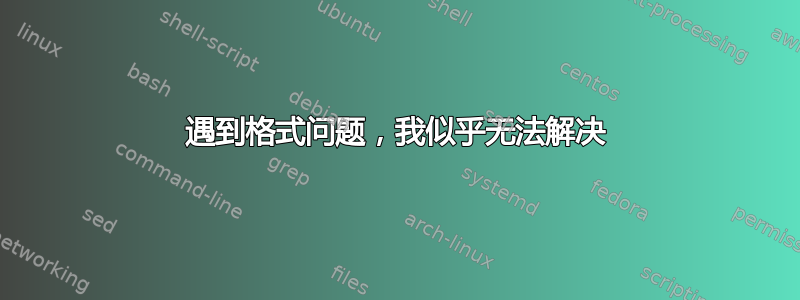

从图片中您应该可以看到,我的枚举环境似乎运行良好,直到我排版表格,然后内容移到左边距。我希望 (a) 和 (b) 对齐,并且表格也位于右侧。
有小费吗?
这是我的代码...
\documentclass{article}
\renewcommand{\thesection}{\Roman{section}}
\renewcommand{\thesubsection}{\thesection.\Roman{subsection}}
\usepackage{setspace}
\usepackage{amsmath}
\usepackage{caption}
\usepackage{amsfonts}
\RequirePackage[left=1.5in,right=1.5in,top=1.5in,bottom=1.5in]{geometry}
\newcommand\state[1]{\ensuremath{q_{#1}}}
\newcommand\blank{\ensuremath{\sqcup}}
\newcommand\lang{\ensuremath{\mathcal{L}}}
\begin{document}
\begin{enumerate}
\item \textbf{Programming Turing Machines}
\begin{enumerate}
\item Give a full description of a Turing machine $M = (Q, \Sigma, \Gamma. \state{0}, \state{accept}, \state{reject}, \delta)$ accepting a language $\lang = \{x \in \{0,1\}^{*}\ |\ x\ is\ divisible\ by\ 4 \}$, ignoring trailing 0s; treat blank string as a 0.
\begin{align*}
M = (Q, \Sigma, \Gamma, \state{0}, \state{accept}, \state{reject}, \delta)\\
Q=\{q_{0},q_{1},q_{2},q_{accept},q_{reject}\}\\
\Gamma=\{0,1,\blank\}\\
\Sigma=\Gamma\setminus\{\blank\}
\end{align*}
\captionof{table}{$\delta: Q\times \Gamma \to Q\times \Gamma\times \{L,R\}$}
\begin{tabular}{c|c|c|c|c}
Current State&Current Character&New State&New Character&Move\\
\hline
\state{0}&1&\state{0}&1&R\\
\state{0}&0&\state{0}&0&R\\
\state{0}&\blank&\state{1}&\blank&L\\
\state{1}&1&\state{reject}&-&-\\
\state{1}&0&\state{2}&0&L\\
\state{2}&1&\state{reject}&-&-\\
\state{2}&0&\state{accept}&-&-\\
\hline
\end{tabular}
\bigskip
\item Give a full description of a Turing machine $M = (Q, \Sigma, \Gamma, \state{0}, \state{accept}, \state{reject}, \delta)$ accepting a language $\lang = \{x \in \{0,1\}^{*}\ |\ x\ does\ not\ have\ repeating\ 1s \}$. ( e.g., x = 110 is rejected and x = 1001 is accepted. )
\begin{align*}
M = (Q, \Sigma, \Gamma, \state{0}, \state{accept}, \state{reject}, \delta)\\
Q=\{q_{0},q_{1},q_{2},q_{accept},q_{reject}\}\\
\Gamma=\{0,1,\blank\}\\
\Sigma=\Gamma\setminus\{\blank\}
\end{align*}
\captionof{table}{$\delta: Q\times \Gamma \to Q\times \Gamma\times \{L,R\}$}
\begin{tabular}{c|c|c|c|c}
Current State&Current Character&New State&New Character&Move\\
\hline
\state{0}&1&\state{0}&1&R\\
\state{0}&0&\state{0}&0&R\\
\state{0}&\blank&\state{1}&\blank&L\\
\state{1}&1&\state{2}&1&L\\
\state{1}&0&\state{1}&0&L\\
\state{1}&\blank&\state{accept}&-&-\\
\state{2}&1&\state{reject}&-&-\\
\state{2}&0&\state{1}&0&L\\
\hline
\end{tabular}
\bigskip
\item Give a full description of a Turing machine $M = (Q, \Sigma, \Gamma, \state{0}, \state{accept}, \state{reject}, \delta)$ accepting a language $\lang = \{x \in \{0,1\}^{*}\ |\ x\ does\ not\ have\ repeating\ 1s \}$. ( e.g., x = 110 is rejected and x = 1001 is accepted. )
\end{enumerate}
\end{enumerate}
\end{document}
答案1
问题似乎是\captionof重置了环境的左边距和右边距enumerate。
像这样嵌入\captionof内部\parbox:
\parbox{\linewidth}{\captionof{table}{$\delta: Q\times \Gamma \to Q\times \Gamma\times \{L,R\}$}}
使用应该可以得到d 列表\linewidth中的正确居中。这是因为LaTeX 使用该参数来确定当时一行的长度。注意不会给出正确的宽度。enumerate\linewidth\textwidth
此解决方案会产生一些您可能不想要的额外垂直空间。但您可以通过添加\vspace{<dim>}适当设置的负尺寸来轻松解决此问题。
这是我的 MWE 的完整副本:
\documentclass{article}
\renewcommand{\thesection}{\Roman{section}}
\renewcommand{\thesubsection}{\thesection.\Roman{subsection}}
\usepackage{setspace}
\usepackage{amsmath}
\usepackage{caption}
\usepackage{amsfonts}
\RequirePackage[left=1.5in,right=1.5in,top=1.5in,bottom=1.5in]{geometry}
\newcommand\state[1]{\ensuremath{q_{#1}}}
\newcommand\blank{\ensuremath{\sqcup}}
\newcommand\lang{\ensuremath{\mathcal{L}}}
\begin{document}
\begin{enumerate}
\item \textbf{Programming Turing Machines}
\begin{enumerate}
\item Give a full description of a Turing machine $M = (Q, \Sigma, \Gamma. \state{0}, \state{accept}, \state{reject}, \delta)$ accepting a language $\lang = \{x \in \{0,1\}^{*}\ |\ x\ is\ divisible\ by\ 4 \}$, ignoring trailing 0s; treat blank string as a 0.
\begin{align*}
M = (Q, \Sigma, \Gamma, \state{0}, \state{accept}, \state{reject}, \delta)\\
Q=\{q_{0},q_{1},q_{2},q_{accept},q_{reject}\}\\
\Gamma=\{0,1,\blank\}\\
\Sigma=\Gamma\setminus\{\blank\}
\end{align*}
\parbox{\linewidth}{\captionof{table}{$\delta: Q\times \Gamma \to Q\times \Gamma\times \{L,R\}$}}\vspace{-1ex}
\begin{tabular}{c|c|c|c|c}
Current State&Current Character&New State&New Character&Move\\
\hline
\state{0}&1&\state{0}&1&R\\
\state{0}&0&\state{0}&0&R\\
\state{0}&\blank&\state{1}&\blank&L\\
\state{1}&1&\state{reject}&-&-\\
\state{1}&0&\state{2}&0&L\\
\state{2}&1&\state{reject}&-&-\\
\state{2}&0&\state{accept}&-&-\\
\hline
\end{tabular}
\bigskip
\item Give a full description of a Turing machine $M = (Q, \Sigma, \Gamma, \state{0}, \state{accept}, \state{reject}, \delta)$ accepting a language $\lang = \{x \in \{0,1\}^{*}\ |\ x\ does\ not\ have\ repeating\ 1s \}$. ( e.g., x = 110 is rejected and x = 1001 is accepted. )
\begin{align*}
M = (Q, \Sigma, \Gamma, \state{0}, \state{accept}, \state{reject}, \delta)\\
Q=\{q_{0},q_{1},q_{2},q_{accept},q_{reject}\}\\
\Gamma=\{0,1,\blank\}\\
\Sigma=\Gamma\setminus\{\blank\}
\end{align*}
\parbox{\linewidth}{\captionof{table}{$\delta: Q\times \Gamma \to Q\times \Gamma\times \{L,R\}$}}\vspace{-1ex}
\begin{tabular}{c|c|c|c|c}
Current State&Current Character&New State&New Character&Move\\
\hline
\state{0}&1&\state{0}&1&R\\
\state{0}&0&\state{0}&0&R\\
\state{0}&\blank&\state{1}&\blank&L\\
\state{1}&1&\state{2}&1&L\\
\state{1}&0&\state{1}&0&L\\
\state{1}&\blank&\state{accept}&-&-\\
\state{2}&1&\state{reject}&-&-\\
\state{2}&0&\state{1}&0&L\\
\hline
\end{tabular}
\bigskip
\item Give a full description of a Turing machine $M = (Q, \Sigma, \Gamma, \state{0}, \state{accept}, \state{reject}, \delta)$ accepting a language $\lang = \{x \in \{0,1\}^{*}\ |\ x\ does\ not\ have\ repeating\ 1s \}$. ( e.g., x = 110 is rejected and x = 1001 is accepted. )
\end{enumerate}
\end{enumerate}
\end{document}



